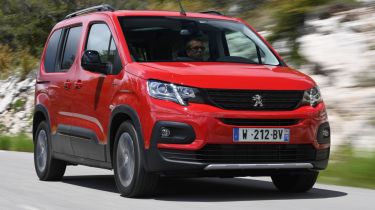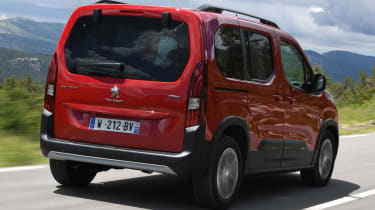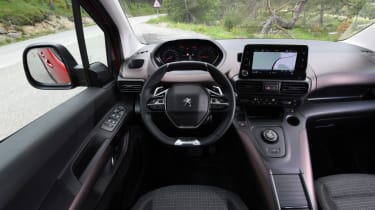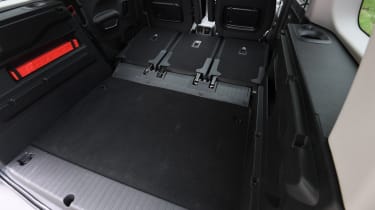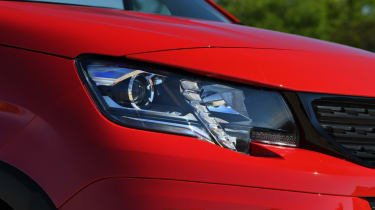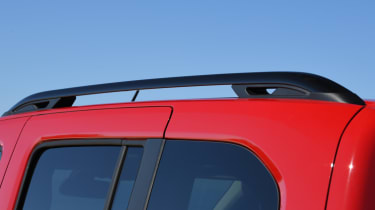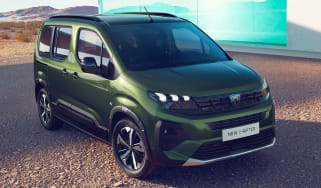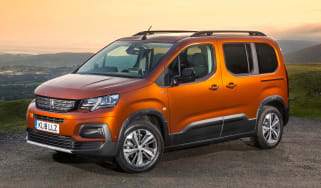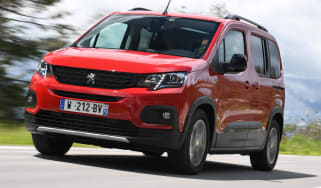Peugeot Rifter review
The Peugeot Rifter MPV is cost-effective, family-friendly transport that masks its van roots well

The Peugeot Partner and Citroen Berlingo van produced by the PSA Group provide the basis for the Rifter MPV, and the passenger version has a sister model in the Berlingo Multispace. The pair are distinguished by individual nose jobs and different exterior trim styles, while inside the Rifter’s dashboard features Peugeot’s favoured i-Cockpit instrumentation that you view over the top of the steering wheel.
Otherwise the two are pretty much identical, with the same boxy body, rear sliding doors and choice of long or short wheelbases – incidentally both versions available with five or seven seats.
• Best people carriers and MPVs
You also get to pick from a range of PureTech petrol and BlueHDi diesel engines, and five or six-speed manual gearboxes, or an auto option depending on engine choice. Like the vans, the Rifter is based on Peugeot’s EMP2 platform, which shares some suspension parts and architecture with hatchbacks in the passenger car range, but is somewhat more basic in line with its commercial vehicle roots.
There are three trim levels: Active, Allure and GT Line. The latter gets an eight-inch touchscreen infotainment set-up, climate control and 17-inch alloys, but all models are pretty well equipped for the money, with air-con as standard.
Peugeot has chosen to dress up the Rifter with some of the design cues you find in the more upmarket SUV/crossover sector, which does give the MPV a bit of a visual lift next to some of its rivals. Apart from the Berlingo, other van-based models the Rifter is up against include the Fiat Qubo, Ford Tourneo Connect and Volkswagen Caddy Life.
Used - available now

2020 Peugeot
Rifter
49,219 milesAutomaticDiesel1.5L
Cash £14,300
2020 Peugeot
Rifter
46,920 milesManualDiesel1.5L
Cash £12,699
2022 Peugeot
Rifter
33,086 milesManualDiesel1.5L
Cash £17,599
2023 Peugeot
Rifter
7,200 milesManualDiesel1.5L
Cash £14,990In spite of their relatively decent specs, cars like the Rifter do inevitably feel built down to a price, with a tendency towards hard plasticky interior trims and a slightly cheap ambience. The upside is vast cabin space with room for everything including the kitchen sink.
The French have a long history of producing van-based family people carriers, and there’s a reason for that. Boxy proportions and low-cost engineering make these cars the perfect choice for active families on a budget, especially those for whom a vehicle is simply a means of transport from A to B, and drivers who don’t buy into the aspirational hierarchy of premium brands. The Peugeot Rifter is a fine example of the breed, offering superb practicality, efficiency and value under a reworked van skin decorated with stick-on SUV cues. With five or seven seats, long and short-wheelbase bodystyles and loads of engine choices, the Rifter has plenty going for it.
Engines, performance and drive
Not everyone wants an MPV that’s fun to drive. There are many people out there who – whisper it – would rather not have to drive anywhere at all, and see getting themselves and the family from A to B as a chore that interferes with the fun stuff at either end of the journey.
The Rifter is perfect for that, because it doesn’t encourage enthusiasm behind the wheel. It works best as a relaxed motorway cruiser when the comfortable ride and low engine noise make long distances a breeze – although the wind noise at speed is a constant reminder of the van body’s basic lack of aerodynamics.
The petrol engines are lighter than the diesel, and it’s noticeable on the road. You get less bobbing about on uneven tarmac with the BlueHDi option, and the nose feels a little more ‘planted’ on the tarmac in corners; the petrol is a bit more unsettled.
This isn’t to say that any Rifter model should inspire spirited cornering, because pressing on in this car will result in an uncomfortable amount of body roll and front wheels that lose grip early to the onset of understeer.
The manual gearshift isn’t the slickest, either, with rather a vague feel. The auto is better, and suits the relaxed driving style the Rifter encourages.
Engines, 0-60 acceleration and top speed
Peugeot’s BlueHDi diesel engine is our favoured choice in the Rifter. In 128bhp form with 300Nm of torque it handles the bulk of the MPV well, serving up an easy driving experience that the petrol can’t quite match, especially if you’re considering the 109bhp petrol PureTech option. The 128bhp PureTech engine will be a better bet if you insist on petrol, and it comes as standard with the smooth-changing eight-speed automatic gearbox.
MPG, CO2 and Running Costs
The PSA Group’s BlueHDi diesel line-up is a byword for efficiency, and while Peugeot hasn’t yet published claimed economy figures for all models, we do know our favourite version – the 128bhp BlueHDi – officially returns an impressive 65.7mpg. The 1.5-litre unit also features stop/start technology and emits 114g/km of CO2, which means an annual VED charge of £140, and £165 in the first year of registration. If you choose to run the BlueHDi 130 model as a company car, it attracts a 27 per cent Benefit-in-Kind rate.
With lower-powered and lower-emitting 99bhp and 75bhp engines in the BlueHDi line-up, there are opportunities to bring your costs down further. The 1.2-litre PureTech petrols – available with 109bhp or 128bhp – are hardly gas-guzzlers, either, so all Rifter models will be easy on your pocket at the pumps.
Aside from the stop/start feature, there’s no dedicated green tech available in the Rifter line-up yet. An electric version is in the pipeline, we’re told, but it’s too far off for Peugeot to have revealed any details.
Other Rifter running costs, including spares, repairs and maintenance, are likely to be low, as commercial operators of the Partner van would expect.
Insurance groups
Insurance groups for the Rifter have yet to be confirmed, but the model’s predecessor – the Partner Tepee – attracted rates that ranged from Group 10 to Group 18. We expect the Rifter to be in a similar ball park when rates are announced.
Depreciation
The Rifter looks like obvious good value for budget-conscious families, and that appeal should transfer into the used market to protect prices when it’s time to sell. It won’t hold onto your cash as well as a Volkswagen Caddy Life, for example, but it shouldn’t present a depreciation disaster.
Interior, design and technology
In spite of its lowly origin, the Rifter has been dressed up and sprinkled with a bit of the SUV/crossover fairy dust in order to broaden its appeal. The designers have done a good job, too, because the MPV has a chunky, Tonka toy-like appeal that suggests it’s good for an adventure or two.
The distinctive Peugeot family nose and grille are eye-catching at the front, while cladding on the body sides and wheelarch extensions, plus the roof rails, accentuate the rugged feel.
Sliding rear side doors are a feature of all the Rifter’s van-based rivals, but they feel like a novel touch and children will love them.
Inside the Rifter shares its configuration with the Partner van, and the dash is identical with its i-Cockpit instrument pack placed high up on the dash so you need to peer over the steering wheel to see it. Drivers tend to love or hate the Peugeot’s unusual instrument set-up, but we have to say it works pretty well in the Rifter, thanks to the upright driving position and tall facia, which makes it easy to see over the wheel.
The rest of the controls are well laid out, with proper switches for the heating and air-con – unlike the new Peugeot 508, which demands you navigate through the touchscreen to set the heating. However, there’s no escaping the hard plasticky feel of much of the cabin.
Sat-nav, stereo and infotainment
The Rifter is available with head-up display, and an 8-inch touchscreen infotainment system that will couple to your smartphone. The big display is installed in a fashionable ‘tablet style’ in the centre of the dash.
Practicality, comfort and boot space
The Rifter comes in a choice of two wheelbases, like the Partner van on which it’s based. Pleasingly you get a five or seven-seat option with both, but the short-wheelbase seven-seater is likely to satisfy the needs of most families.
The upright driving position offers good visibility, and the slab sides and short nose make the Rifter easy to place on the road or park. However, the car’s real forte is the amazingly well thought-out cabin storage – there’s 180 litres of space in the various lockers, cubbies and door bins, and that’s more than the boot space in some city cars. The door bins can hold several big bottles of water, there’s a locker in the dashboard that will store a laptop and an overhead locker folds down airline-style for passengers in the rear.
Size
The short-wheelbase Rifter measures 4,403mm from bumper to bumper, while the long version is 4,753mm – and the extra length is all behind the third row of seats, so you get phenomenal boot space. All models are 1,848 wide and 1,849mm high, with roof rails.
For comparison, the Ford S-MAX MPV measures up at 4,796mm long.
Leg room, head room & passenger space
There are plenty of ways to configure the seats in a Rifter, because the rear seats are available with a 60:40 split or as three individual seats with the Magic Flat system which can be folded to the floor. The third row consists of two individually removable seats.
Boot
The Rifter is blessed with a massive boot, and Peugeot claims a load volume of up to 4,000 litres for the long-wheelbase version with all the seats folded flat. When the seats are in place, you still get a whopping 1,050 litres. The standard-length Rifter five-seater offers 775 litres of boot space, which grows to 3,000 litres if you drop the seats.
Reliability and Safety
We haven’t yet got the full picture of the safety gear that’s going to be fitted to the Rifter here in the UK. It seems certain that assisted emergency braking will be available, but don’t expect too much in the way of autonomous systems beyond blind-spot warning and lane departure.
We’ve got to wait for Euro NCAP to crash test the Rifter, too, and although the outgoing Peugeot Partner Tepee only managed three stars in its Euro NCAP test, we’re hoping for better things this time around. The DS 7 Crossback SUV uses the same platform as the Rifter, and that was awarded five stars, which bodes well for the Peugeot.
As far as reliability goes, it’s too early to say, although Peugeot hasn’t performed especially well as a brand in our Driver Power satisfaction survey. In 2018 it was rated 17th out of 26. On a much more positive note, the Peugeot 3008 SUV was ranked the best car to own in the latest survey, and again this model shares some of its platform engineering with the Rifter.
Warranty
Peugeot includes a three-year/60,000-mile warranty with all of its new vehicles.
Servicing
Servicing costs should be reasonable, and dealers offer schemes to spread the cost with monthly instalments.
